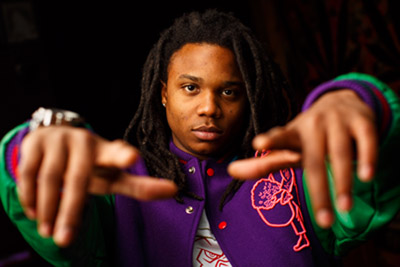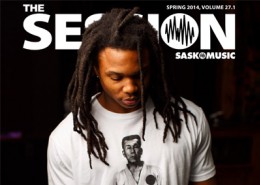Pimpin’ ain’t easy --- or so the saying goes. Being Pimpton isn’t always easy either, but it definitely has its payoffs. Regina-based, 23-year-old Kyriel ‘Pimpton’ Roberts has been getting a lot of attention as of late, having released not one, but two albums last year, The Deal Breaker: Manifest Destiny and Killa Call Me Killa, Vol. 1. His single Pom Pom Wit Killa Inside is currently in rotation on MuchMusic’s MuchVibe. He’s been plugging away since high school, and he’s part of the rap crew Crown Jewel Entertainment [CJE], and he’s opened for rap icons like both Raekwon and Gza from The Wu Tang Clan, Swollen Members, Bone Thugz N’ Harmony, and more.
Pimpton’s MC flow is tight, whether he’s rapping about social ills or just throwing down a party cut. His production is a hybrid of old school sounds and new school techniques, with the aim of pushing the envelope on the genre of hip hop. I recently chatted with Pimpton and we talked about his childhood in Trinidad and Tobago, why he loves rap, and being in the rap game in The SK.
 CRAIG SILLIPHANT: Let’s take it all the way back --- how did you get into hip hop?
CRAIG SILLIPHANT: Let’s take it all the way back --- how did you get into hip hop?
PIMPTON: I always had a love for poetry and the arts and had a natural talent for rap as a kid. Also hip hop music was
strong and vibrant in the black community during the early ‘90s, driven by the breakthroughs of the civil rights movements, and also what I would classify as an identity crisis among the black youth of America. In identifying with the struggles that surfaced within the black community, I began to identify with the black people I saw on TV, who appeared to have overcome the struggle, who for the most part were rappers and other kinds of hip hop artists. It was a medium through which I felt I could express my situation and experiences. Even though as a kid I had a lot of friends, I was always the only black kid in my class. So I often felt lonely and out of place. This loneliness caused me to spend a lot of time by myself, in which I would council myself by writing poems and songs. Long story short hip hop offered me an escape from the struggle.
CS: Whom did you first respond to in rap? Who are your influences?
PIMPTON: Will Smith, because he was one of the more popular rap artists of the 90s who didn’t cuss in his music and so my dad bought me his CD Big Willy Style. It was the first rap CD I ever owned. Dr. Dre’s Chronic was the first rap CD I ever borrowed from the public library and so that also played a lead role in my love for rap. My early influences would include the Hot Boys [Lil’ Wayne], Outkast, the Fugees, Wu-Tang Clan, Snoop Dogg, and Kanye West when he came out with The College Dropout. Just based on my lifestyle, my experiences and surroundings, these artists all had lyrics that caught my attention and they became people I looked up to.
CS: What about strong influences outside of hip hop?
PIMPTON: I would have to say my friends and family. Simply because I am influenced by my experiences and those are the people with whom I’ve shared most experiences.
CS: Where did the name Pimpton come from?
PIMPTON: The name Pimpton is a self-title that I came up with when I created my first [journal] of lyrics. I was a hip hop dancer between the ages of 9 and 17 years old. So from a very young age I had a favorable female following and the name Pimpton just seemed appropriate. I remember my grade 5 elementary school teach would catch feelings every time I would sign my name as Pimpton on my work books and dossiers. I used to sign it on everything.
CS: You are originally from Trinidad and Tobago. What was your life like there?
PIMPTON: It was beautiful. It’s an amazing place. The island itself is visually euphoric, and it’s filled with generally energetic, happy, and helpful people. I left when I was very young though so most of my memories are of my current life. [I] still try to visit home every other year.
CS: When did you move to Saskatchewan?
PIMPTON: I moved to [Saskatchewan] in ‘94. There was a lot of turbulence in the government of Trinidad that year and my parents decided we should move. The decision was made with the goal of giving my sister and I better opportunities than those which were offered in T&T.
CS: What differences do you notice in terms of music between Trinidad and Canada? What other differences stand out to you, aside from music?
PIMPTON: In my opinion the musical genre and lyrical content would stand out first. In Trinidad the more dominant styles of music are Calypso and Soca. Aside from music I would have to say the delivery. Trinidadians have an art for saying big things and touching on very controversial points in a very subtle way. Canadian artist to me seem to a little more blunt.
CS: What process do you go through to craft your rhymes?
PIMPTON: I turn up the beat, bunn up, and allow myself to get lost in the music until I catch the vibe. Sometimes the vibe isn’t always as apparent as other times so in those situations I try to interpret the beat and most likely will end up experimenting with some new flows or patterns. I am 100% for experimentation. I’m really big on the technical aspects of lyricism. So finding a unique flow I can manipulate and play with is generally my goal. Once I lock that down I just lose myself in the music and write whatever expresses my current state of mind or mood.
CS: How can you tell if the flow is working once you’ve written some lyrics?
PIMPTON: I just keep writing until I know I got it. I also have my Grade 3 Harmony in Classical Music Theory, so I’m familiar with tempo structures and rhythms. Tempo, Rhythm, Vocabulary and Practice are the key ingredients to having a perfect flow in my opinion. Beyond that all you can do is experiment.
CS: How important is reading and knowledge of culture to you in writing lyrics?
PIMPTON: Reading and knowledge of culture is important in life period. Being an artist consists of expressing life situations and experiences through an artificial medium or an utterance. Reading enables a person to have a greater vocabulary, which allows the person the ability to express themselves in a more widely comprehensible way.
CS: How do your beats come about? Who produces your stuff?
PIMPTON: At this point I definitely have a list of producers that I have a strong [working] relation with, many of whom reside in Saskatchewan. I just check my email and write raps. My dudes send me beats constantly. I think it’s because I have such a strong work ethic and my turn around time is always on point. Also I have a distinct style that seems to blend with a myriad of production styles. Most of the time producers send me beats saying that they already heard me flowing on it as soon as they finished making it. Manifest destiny.
CS: Tell me about CJE.
PIMPTON: CJE is a collective of Saskatchewan based hip hop artists, producers, and musicians who came together in late 2010 in attempts to create and establish a Saskatchewan hip hop and rap scene. To my knowledge the majority of mainstream artists that have passed though Saskatchewan in the last four years, we have opened for. If you’re a hip hop artist and you’re in Saskatchewan, you’re gonna hear about CJE.
For the most part we all grew up together and have been rapping and performing together since we were young teens. Currently we are working on a new compilation album project that will feature some of our favorite heavy hitting producers and beat makers as well as a kaleidoscope of flavorful styles that each artist brings to the table laced with the smooth lyrics, confident delivery and jaw-breaking punchlines that our fans have grown to love and respect. CJEsus!
CS: Who is the coolest person you’ve been able to play?
PIMPTON: Opening for Andre Nickatina and recording a track with him, because he’s one of my top five favorite artists and it’s just a next level experience to watch your goals manifest. I also drove out to California where I filmed a video for our song entitled Little Darrell (prod. Suede) which is from The Deal Breaker: Manifest Destiny. It was just an all around positive experience kickin’ it with King Nicky. It’s all love in the Bay Area for CJE now, because Nickatina is considered one of the hip-hop legends of the Bay. When you’re able to gain the respect of some one like that, your network expands exponentially, and everything else just falls into place.
CS: Most people don’t think of the prairie as a place where you’re going to find a wealth of good hip hop, but I’d disagree. There are tons of great acts. Why do you think we make good hip hop on the prairie?
PIMPTON: Hip hop music is a global phenomenon. There are no geographical limitations. The only flaw in the prairies is that hip hop music isn’t a popular style among the older generation who control the radio stations’ output. As far as why we make good hip hop music in the prairies, all I can say is why not? Good hip hop exists where good people exist.
 CS: What does the perfect Pimpton party look like?
CS: What does the perfect Pimpton party look like?
PIMPTON: The perfect Pimpton party looks like trophies and plaques on the walls, friends and family in the hall, bottles, free medical marijuana and good DJs.
CS: Speaking of blunts, does rapping about blunts, or even sex, ever get you in trouble in a conservative environment like Saskatchewan?
PIMPTON: It’s definitely caused some folks to turn up their noses and expose their dirty nostrils. But to me once again it’s about expressing myself. Blunts happen to be a part of my lifestyle. I am a government issued medicinal marijuana smoker. And as for sex, I’m a young man with a healthy sexual appetite. Times are changing and I would just like to remind my conservative friends to keep up. When the older generation was my age, the same rock n’ roll music that they now praise as Hall of Fame-worthy and the expressive behaviors that went hand in hand with the spirit of rock n’ roll were frowned upon and considered radical.
CS: Do you feel like you encounter racism locally?
PIMPTON: Without a doubt. Just like most forms of oppression there are degrees to local racism. The extremities ranging from intentional to ignorance. So maximum racism in Saskatchewan would be an individual intentionally behaving in a way that exhibits racially based beliefs. And minimal racism would consist of an individual behaving in a way that exhibits racially based beliefs, where the cause is a lack of information or misinformation.
CS: How has your music been received outside of North America?
PIMPTON: Surpassing expectations. I ended up linking with a producer in Norway named Kholebeatz who has done wonders for my career and network. So Pimpton is definitely poppin’ in Europe! It’s crazy when you start getting fans and people reaching out to you from places you’ve never even Googled or seen on a map, let alone visited.
CS: What are your plans for the near future?
PIMPTON: This year I plan to record new material and shoot and release more high quality music videos. I also plan to do some traveling and play shows in new cities as well as cities I have previously visited to increase and improve my fan base and to strengthen network. I’ll be attending all major Canadian music related festivals and conferences including Canadian Music Week [CMW 2014] in Toronto where I will be [showcasing]. To all my fans, be on the look out for Killa Call Me Killa Vol. 2, set to be released in the fall of 2014, as well as a new CJE compilation disc later in the year.
CS: How do you measure your own success?
PIMPTON: By the people I have positive impacts on and by my level of happiness. Every time some person older or younger approaches me and tells me that I inspired them to do better, or to [pursue] their dreams or helped them through a rough time, I know I’m successful. My long-term goals include being able to provide for my family strictly by means of an income generated from doing what I love, and also becoming an internationally established and respected hip hop artist. Another goal of mine is to show the world that hip-hop exists in Saskatchewan, and that Saskatchewan hip hop is as good if not better than a lot of the stuff that gets attention these days. So when that happens, we’re gold.
CS: And lastly, the clichéd question --- what advice would you give to other young rappers out there?
PIMPTON: Believe in yourself. Practice hard to perfect your skill. Take every opportunity that seems to you to be beneficial. And don’t compromise your belief in yourself.
For more on his music, visit www.reverbnation.com/thepimpton, or find him on CBC Music, Facebook, and Twitter.
Originally published Spring 2014. This article is posted as initially published. For reprint/usage permission or any other questions, please contact SaskMusic.








